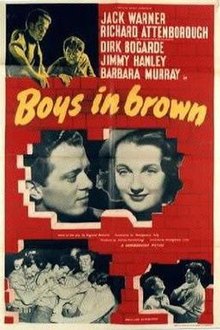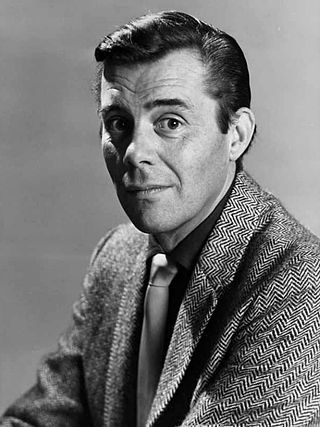
Sir Dirk Bogarde was an English actor, novelist and screenwriter. Initially a matinée idol in films such as Doctor in the House (1954) for the Rank Organisation, he later acted in art house films, evolving from "heartthrob to icon of edginess".
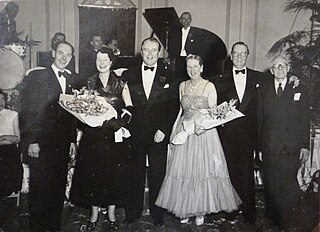
Jack Warner, OBE was a British actor. He is closely associated with the role of PC George Dixon, which he played in the 1950 film The Blue Lamp and later in the television series Dixon of Dock Green from 1955 until 1976, but he was also for some years one of Britain's most popular film stars.
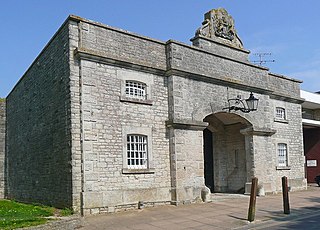
A borstal was a type of youth detention centre in the United Kingdom, several member states of the Commonwealth and the Republic of Ireland. In India, such a detention centre is known as a borstal school.

The Blue Lamp is a 1950 British police procedural film directed by Basil Dearden and starring Jack Warner as PC Dixon, Jimmy Hanley as newcomer PC Mitchell, and Dirk Bogarde as criminal Tom Riley.

Cecil Parker was an English actor with a distinctively husky voice, who usually played supporting roles, often characters with a supercilious demeanour, in his 91 films made between 1928 and 1969.
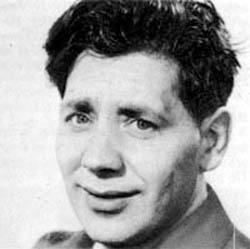
Alfie Bass was an English actor. He was born in Bethnal Green, London, the youngest in a Jewish family with ten children; his parents had left Russia many years before he was born. He appeared in a variety of stage, film, television and radio productions throughout his career.

The Army Game is a British television sitcom that aired on ITV from 19 June 1957 to 20 June 1961. It was the very first ITV sitcom and was made by Granada, and created by Sid Colin. It follows the exploits of Hut 29, a dysfunctional group of soldiers and their National Service conscription into the British Army during the post war years.
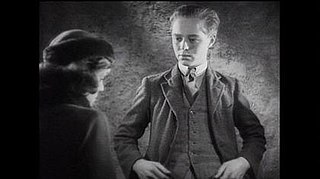
Jimmy Hanley was an English actor who appeared in the popular Huggetts film series, and in ITV's most popular advertising magazine programme, Jim's Inn, from 1957 to 1963.

Richard Gordon, was an English ship's surgeon and anaesthetist. As Richard Gordon, Ostlere wrote numerous novels, screenplays for film and television and accounts of popular history, mostly dealing with the practice of medicine. He was best known for a long series of comic novels on a medical theme beginning with Doctor in the House, and the subsequent film, television, radio and stage adaptations. His The Alarming History of Medicine was published in 1993, and he followed this with The Alarming History of Sex.

A Kind of Loving is a 1962 British kitchen sink drama film directed by John Schlesinger, starring Alan Bates and June Ritchie. It is based on the 1960 novel of the same name by Stan Barstow which was later adapted into the 1982 television series A Kind of Loving. The film tells the story of two lovers in early 1960s Lancashire. It belongs to the British New Wave movement.
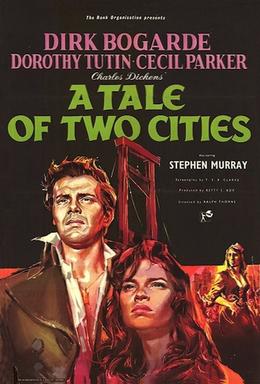
A Tale of Two Cities is a 1958 British film directed by Ralph Thomas and starring Dirk Bogarde and Dorothy Tutin. It is a period drama based on parts of Charles Dickens' novel A Tale of Two Cities (1859).
Wilfred John Raymond Lee was a British film director, screenwriter, editor, and producer, who directed a number of postwar films on location in Asia and Australia for The Rank Organisation.

Ernest Lytton Leslie Forwood, known professionally as Anthony Forwood, was an English actor.
Afternoon Off is a 1979 television play by Alan Bennett. Broadcast under the umbrella title Six Plays by Alan Bennett, it was produced for London Weekend Television and directed by Stephen Frears. The screenplay was published by Faber and Faber in 1984.
Once a Jolly Swagman is a 1949 British film starring Dirk Bogarde, Bonar Colleano, Bill Owen, Thora Hird and Sid James. It is centred on the sport of motorcycle speedway racing, which was at its peak of popularity at the time. It was released in the U.S. as Maniacs on Wheels. The film is based on the 1946 novel by Montagu Slater.

These Dangerous Years is a 1957 British drama musical film directed by Herbert Wilcox and starring George Baker, Frankie Vaughan, Carole Lesley, Thora Hird, Kenneth Cope, David Lodge and John Le Mesurier.
There Ain't No Justice is a 1939 British sports drama film directed by Pen Tennyson and starring Jimmy Hanley, Edward Chapman and Edward Rigby. The film is based on the 1937 novel of the same name by James Curtis.

For Better, for Worse is a 1954 British comedy film in Eastmancolor directed by J. Lee Thompson and starring Dirk Bogarde, Susan Stephen and Cecil Parker. It was based on Arthur Watkyn's play of the same title.

One Good Turn is a 1955 British comedy film directed by John Paddy Carstairs and starring Norman Wisdom, Joan Rice, Shirley Abicair and Thora Hird. The main setting of the film is an English children's home, located south of London.

The Cure for Love is a 1949 British comedy film starring and directed by Robert Donat. The cast also includes Renee Asherson and Dora Bryan. The film was based on a hit play of the same name by Walter Greenwood about a mild-mannered soldier returning home after the Second World War.
